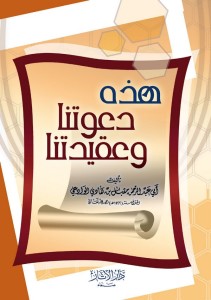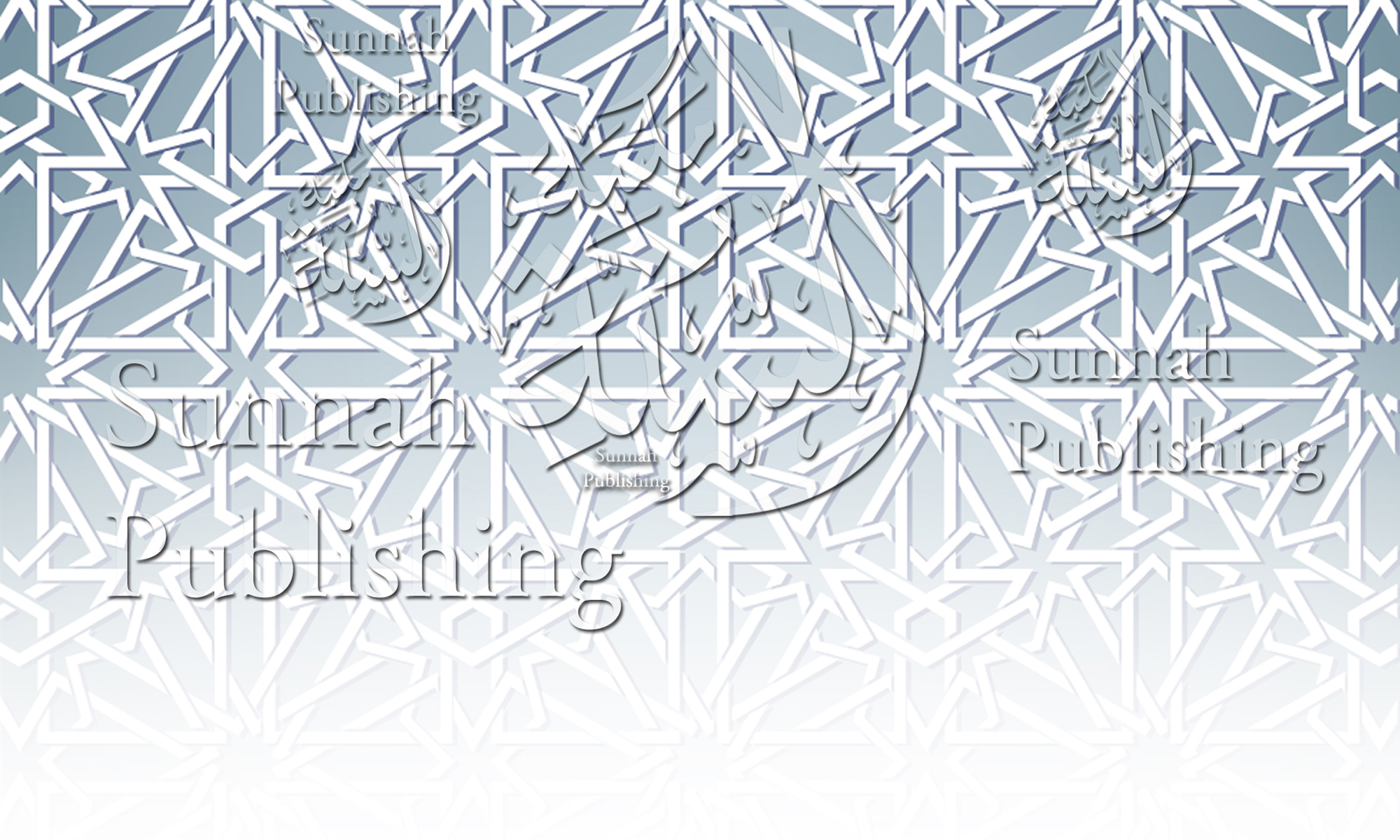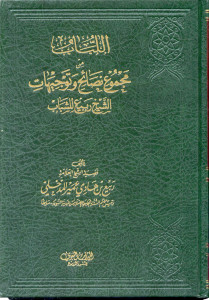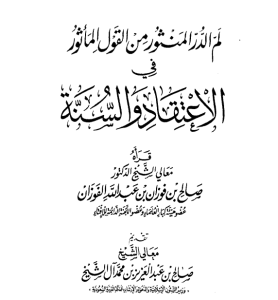
[1]: We believe in Allaah and His Names and Attributes, as they were mentioned in the Book of Allaah and in the Sunnah of the Messenger of Allaah (sallallaahu ’alayhi wa sallam), without tahreef (distortion), nor ta‘weel (figurative interpretation), nor tamtheel (making a likeness), nor tashbeeh (resemblance), nor ta’teel (denial).
[2]: We believe that calling upon the dead and seeking aid from them, and similarly with the living, in that which no one besides Allaah is capable of, is Shirk with Allaah.
[3]: Likewise, believing that charms and amulets can bring about benefit along with Allaah, or without Allaah is Shirk, and carrying them without that belief is superstition.
[4]: We take the Book and the Sunnah upon their apparent meanings, and we do not perform ta‘weel, except through a proof that necessitates ta‘weel (figurative interpretation) from the Book and the Sunnah.
[5]: We believe that the Believers will see their Lord in the Hereafter, without inquiry into how that will occur. We believe in the Intercession (ash-Shafaa’ah) and in the people of Tawheed being taken out of the Fire.
[6]: We love the Companions (radiyallaahu ’anhum) of the Messenger of Allaah (sallallaahu ’alayhi wa sallam), and we hate those who speak against them. We believe that revilement of them is revilement of the Religion, because they are the ones who conveyed it to us. We love the Family of the Prophet (sallallaahu ’alayhi wa sallam) with a love that is legislated by the Sharee’ah.
[7]: We love the people of hadeeth and the rest of the Salaf of the Ummah from Ahlus-Sunnah.
[8]: We despise ’ilmul-kalaam (theological rhetoric) and we view it to be from amongst the greatest causes for the division in the Ummah.
[9]: We do not accept anything from the books of the fiqh (jurisprudence), nor from the books of the tafseer (exegesis), nor from the ancient stories, nor from the Seerah (biography) of the Prophet (sallallaahu ’alayhi wa sallam), except that which has been confirmed from Allaah or from His Messenger (sallallaahu ’alayhi wa sallam). This does not mean that we have rejected them, nor do we claim that we are not in need of them. Rather, we benefit from the deductions of our Scholars, the jurists and other than them. However, we do not accept a ruling, except with an authentic proof.
[10]: We do not write in our books, nor do we cover in our lessons, nor do we give sermons with anything except the Qur‘aan or a hadeeth that is qualified to be used as a proof. And we detest what emanates from many writers and admonishers in terms of the false stories and weak and fabricated ahaadeeth.
[11]: We do not perform takfeer upon any Muslim due to a sin, except Shirk with Allaah, or the abandonment of the Prayer, or apostasy. May Allaah save us and you from that.
[12]: We believe that the Qur‘aan is the Speech of Allaah, it is not created.
[13]: We hold co-operation with any Muslim upon the truth to be obligatory and we declare ourselves free in front of Allaah from the calls of al-Jaahiliyyah (pre-Islaamic times of ignorance).
[14]: We do not deem it correct to revolt against the Muslim rulers as long as they are Muslims, nor do we feel that revolutions bring about rectification. Rather, they corrupt the society…
[15]: We hold that this multiplicity of present day parties is a reason for the division of the Muslims and their weakness.
[16]: We hold that the da’wah (call) of the Ikhwaanul-Muslimeen is incapable and unfit to bring about the rectification of the society. Indeed, their da’wah has become political, not religious. It is also a da’wah of innovation, because it calls to making a pledge of allegiance to someone unknown. It is a da’wah of fitnah (trial, tribulation) because it is founded upon ignorance, and it traverses upon ignorance. We advise some of the noble brothers who work within it to abandon it, and to not waste their time with that which does not benefit Islaam and the Muslims. The concern of the Muslim should be that Allaah aids Islaam and the Muslims.
[17]: As for Jamaa’atut-Tableegh, then before you is what was written by the noble brother, Muhammad Ibn ‘Abdul-Wahhaab al-Wassaabee (hafidhahullaah). He stated:
-
-
- They act upon weak ahaadeeth. Rather, they act upon fabricated ahaadeeth and that which has no basis.
- You will find amongst them many innovations. Rather, their call is built upon innovations, since the backbone of their call is al-khurooj (to go out) with the following restriction: (at least) three days out of every month, forty days in a year and four months in a lifetime. They have two excusions (jawlah) in every week: one excursion to the masjid that is prayed in and a second roaming excursion. In every day they have two study circles: one circle in the masjid that is prayed in and a second one in the home. They will never be pleased with an individual unless he sticks to this and there is no doubt that this is an innovation in the Religion for which Allaah has sent down no authority.
- They hold that the call to Tawheed causes conflict within the Ummah.
- They hold that the call to the Sunnah causes conflict within the Ummah.
- Their leader at al-Hudaydah says: An innovation that brings the people together is better than a Sunnah that causes splits between them.
- They have enmity towards Ahlus-Sunnah.
- They directly and indirectly deprive the people of beneficial knowledge.
- They hold that there is no salvation for the people except through their way. They strike a parable for that with the Ark of Nooh (‘alayhis-salaam); whoever boards it is saved and whoever does not board it is destroyed. They say, “Indeed, our da’wah is like the Ark of Nooh.” I have heard this parable from them in Jordan and Yemen.
- They do not give importance to Tawheed al-Uloohiyyah (Oneness of Allaah’s worship) and Tawheedul-Asmaa` was-Sifaat (Oneness of Allaah’s Names and Attributes).
- They do not prepare to seek knowledge. They hold that time spent in the search for knowledge is a waste. And they have other than what is mentioned here.
-
[18]: We restrict our understanding of the Book of Allaah and of the Sunnah of the Messenger of Allaah (sallallaahu ’alayhi wa sallam) to the understanding of the Salaf of the Ummah from the Scholars of hadeeth, not blindly following individuals amongst them. Rather, we take the truth from whoever comes with it. We know that there are those who claim Salafiyyah, yet Salafiyyah is free from them, because they take the same course as the society to make lawful that which Allaah has made unlawful (like the companions of ‘Abdur-Rahmaan ‘Abdul-Khaaliq and Muhammad Suroor).
[19]: We believe that politics is a part of the Religion, and those who attempt to separate the Religion from politics are only attempting to destroy the Religion and to spread anarchy. Likewise, the statement that has been spread in some of the Muslim lands, ‘The Religion is for Allaah, but the homeland is for everyone,’ is a call of jaahiliyyah. Rather, everything belongs to Allaah.
[20]: We believe there will be no honor or victory for the Muslims until they return to the Book of Allaah and to the Sunnah of the Messenger of Allaah (sallallaahu ’alayhi wa sallam).
[21]: We hate the present day parties (ahzaab): the apostate Communist party, the apostate Ba’thee party, the apostate Naasiree party, the apostate Socialist party, and the renegade Raafidee party.
We believe that all of the people are divided into two parties: the party of ar-Rahmaan (the Most Merciful); they are those who implement the pillars of Islaam and the pillars of eemaan (faith) without rejecting anything from the Sharee’ah (legislation) of Allaah. Then there is the party of Shaytaan, and they are those who wage war against the Sharee’ah of Allaah.
[22]: We oppose those who divide the Religion up into the peel (i.e. trivialities) and the core (i.e. important issues). We know that this is a destructive da’wah.
[23]: We oppose those who belittle the knowledge of the Sunnah and say that this is not the time for it. Likewise, we oppose those who belittle acting upon the Sunnah of the Messenger of Allaah (sallallaahu ’alayhi wa sallam).
[24]: We hold that the most important affairs must be given precedence over others. So it is obligatory upon the Muslims that they give importance to correcting the ’aqeedah (creed), then to thwart the Communists and the Ba’th party. This cannot occur, except by unity upon holding fast to the Book and the Sunnah.
[25]: We hold that no Jamaa’ah, that gathers within it the Raafidee, the Shee’ee, the Soofee and the Sunnee, is not capable of facing the enemies, because that cannot occur, except with true brotherhood and unity upon the correct ’aqeedah.
[26]: We oppose those who are arrogant and claim that the callers to Allaah are Wahhaabee agents. We know that their wicked intention is that they wish to place an obstruction between the common-folk and the people of knowledge.
[27]: Our da’wah and our ’aqeedah are more beloved to us than our own selves, our wealth and our offspring. We are not prepared to part with them for gold, nor silver. We say this so that no one may have hope of buying out our da’wah, nor should anyone think that it is possible for them to purchase it from us for deenaar, nor dirham. Since the politicians already know this about us, they have despaired of buying it from us with granted positions or wealth.
[28]: We love the governments in accordance to what they have of goodness, and we hate them for what they have of evil. We do not permit revolting against them, except if we have seen clear disbelief from them about which we have a proof from Allaah, with the condition that we are capable of that, and that there not be any civil strife between the Muslims on both sides. Since the rulers portray those who revolt against them as spies causing corruption. And thereupon, other conditions come in, refer to our other books.
[29]: We accept direction and advice from wherever it comes and we know that we are students of knowledge, we are correct sometimes and we are incorrect at other times. We are ignorant at times and knowledgeable at times.
[30]: We love the present day Scholars of the Sunnah and hope to benefit from them and we feel sorrow over the indifference that many have towards them.
[31]: We do not accept a fatwaa, except from the Book of Allaah and the confirmed Sunnah of the Messenger of Allaah (sallallaahu ’alayhi wa sallam).
[32]: We oppose those in authority who visit the grave of Lenin and other than him from the leaders of apostacy for the purpose of glorification.
[33]: We oppose the Muslim rulers uniting with the enemies of Islaam, whether they by the Americans or the Communists.
[34]: We oppose the calls of jaahiliyyah, such as nationalism and Arab-nationalism. We oppose them and we consider them calls of jaahiliyyah and we hold that they are reasons for the downfall of the Muslims.
[35]: We are awaiting the reviver with whom Allaah revives this Religion. Aboo Daawood (d.257H) – rahimahullaah – related in his Sunan from Abee Hurayrah (radiyallaahu ’anhu), from the Prophet (sallallaahu ’alayhi wa sallam) who said, “Indeed, Allaah sends at the head of every one hundred years a reviver for this Ummah who revives its Religion.” [1] We hope that the Islaamic awakening will pave the way for him.
[36]: We firmly believe in the misguidance of the one who rejects the ahaadeeth pertaining to the Mahdee, the Dajjaal (anti-Christ) and the descent of ’Eesaa Ibn Maryam (’alayhis-salaam). We do not mean the Mahdee of Raafidah. Rather, we mean the leader from the Family of the Prophet (sallallaahu ’alayhi wa sallam), from the people of the Sunnah filling up the earth with justice and fairness, just as it was filled with oppression and injustice before. We say that he is from Ahlus-Sunnah, because cursing the best of the Companions is not from justice.
[37]: These are glimpses into our ’aqeedah and our da’wah. Mentioning them with their proofs would lengthen the book. Indeed, I have mentioned their proofs in al-Makhraj minal-Fitnah. So if one has any objection to this, then we are prepared to accept advice if it is correct, and to refute it if it is erroneous, and to avoid it if it is stubborn rejection. And Allaah knows best.
So let it be known that this has not fully covered our da’wah and our ’aqeedah, since our da’wah is from the Book and the Sunnah, to the Book and the Sunnah, and our ’aqeedah is likewise. And Allaah is sufficient for us, and He is the best of those who are trusted. And there is no might, nor power, except with Allaah. [2]
Endnotes:
[1]: Saheeh: Related by Aboo Daawood (no. 4291). It was authenticated by al-Albaanee in Silsilatus-Saheehah (no. 599).
[2]: Taken from Tarjamah Abee ‘Abdir-Rahmaan Muqbil Ibn Haadee al-Waadi’ee (p. 135-142), slightly adapted.
Translation by Maaz Qureshi



